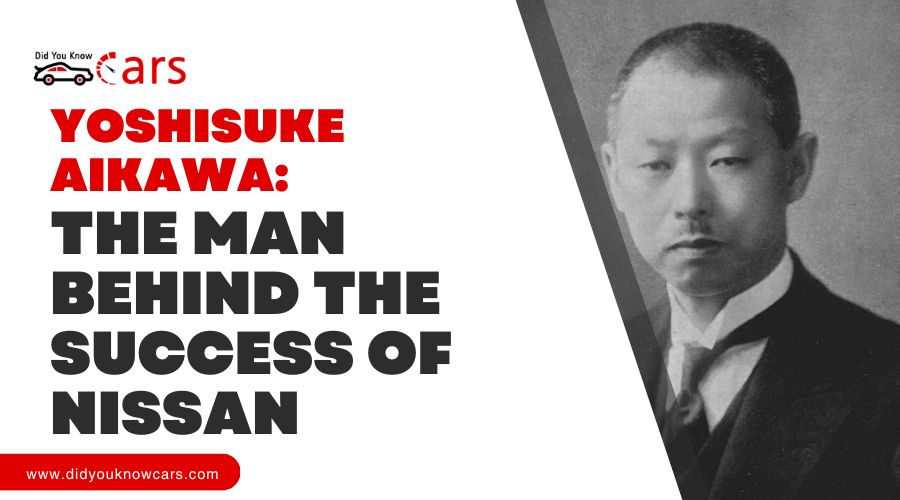When we talk about the pioneers of the Industrial Revolution in Japan, one name that must be mentioned is Yoshisuke Aikawa. A visionary entrepreneur, Aikawa’s contributions to Japan’s industrial development, particularly in the automotive and zaibatsu (business conglomerate) sectors, are monumental.
His story is not just one of business success but also of overcoming challenges, adapting to changing times, and leaving a lasting impact on Japan’s economic landscape. Learn about his life and legacy here.
Early Life, Background, and Education
Yoshisuke Aikawa was born on November 6, 1880, in Choshu, which is now part of Yamaguchi Prefecture. Born into a family with a strong business background, Aikawa was well-positioned to understand the nuances of Japan’s economic environment from a young age.
Choshu was the birthplace of many thinkers, statesmen, and warriors of Japan. The Choshu spirit may be termed as one of rebellion against authorities (then the Tokugawa Shogunate), and this spirit made Choshu one of the leading powers in restoring the Emperor to supremacy and in pushing Japan to become a modern industrial nation. This spirit was instilled into Yoshisuke Aikawa, the first son of the Choshu samurai Yahachi Aikawa.
This rebelliousness and disdain were further nurtured after the samurai families were displaced and left to sink into poverty after the Meiji Restoration and the dissolution of the samurai class. His mother, Nakako, was the niece of the Meiji-era statesman Inoue Kaoru, but her fortunes plummeted when she married Yahachi. Yoshisuke was driven to help his parents escape poverty and do something for his parents, and this sense of dissatisfaction made him determined to succeed and get ahead.
Education
He pursued his education at Tokyo Imperial University, where he majored in engineering, and graduated in 1903. This technical background laid the foundation for his future endeavors in the industrial sector.
While doing post-graduate work, he went to work for Shibaura Seisakusho (now Toshiba) as a laborer. As he became acquainted with the industry, he was disheartened to learn that companies that were succeeding in Japan were only those that employed Western technology, and no companies succeeded using purely Japanese technology. So, even though his pay was very low, he saved up so he could study overseas.
By the age of 25 in 1905, Aikawa went to America and worked as an apprentice at a foundry plant and learned by doing. He studied malleable cast iron technology, and this enabled him to build a great industrial empire later in life.
Business Endeavors
Founding Tobata Foundry
When he returned to Japan, Aikawa forayed into business by founding the Tobata Foundry in June 1910. His company specializes in casting metals. It was here that Aikawa honed his skills in industrial management and operations. His ability to foresee market trends and adapt accordingly was evident early in his career. He expanded Tobata Casting’s operations, diversifying into related fields and setting the stage for future growth. This company is now known as Hitachi Kinzoku (Hitachi Metals Company Ltd).
Leading a Mining Company
In 1928, Yoshisuke Aikawa took the helm of Kuhara Mining Company and became president, taking over from his brother-in-law Fusanosuke Kuhara. This company is now known as Nippon Mining & Metals Company.
When Aikawa took over the company, it was virtually bankrupt because of the recession due to World War I and the 1923 Great Kanto Earthquake. But he moved quickly to implement his ideas to get the company up and running. Aikawa took the company public and gained access to the public’s money.
The Birth of Nissan and Developing the Zaibatsu System
To gain funding for his mining company, he created a public holding company, Nihon Sangyo, which was later known as Nissan. This was the first company of its kind in Japan.
In the early 1930s, he consolidated several automobile-related companies under a holding company to create a new corporate entity. He spun off Nihon Mining and brought it under the Nissan umbrella, and started selling stocks at a markup. Immediately, Nihon Mining became a star – pushing the parent company Nissan to stock up to 10 times par value.
After that, Aikawa funded the Jidosha Seizo car company with the money he raised from the public. Jidosha Seizo later became known as Nissan Motor Company in 1934. This move was not just about creating a new corporate entity but about envisioning a future where Japan could compete globally in the automotive sector. Under his leadership, Nissan quickly grew to become one of the foremost automakers in Japan.
Soon, the Nissan holding company controlled 18 subsidiaries and 130 sub-subsidiaries with a total capital of 220 million yen. Because of this, Aikawa became instrumental in the development of the zaibatsu system in Japan. He believed in the power of large conglomerates to drive economic growth and industrial development. His approach was not just about expanding his own business interests but also about contributing to the broader economic development of Japan.
The zaibatsu system, with its focus on centralization and efficiency, played a critical role in Japan’s rapid industrialization during the early 20th century. His company was unlike other zaibatsus that needed a founding family with a controlling majority interest. This new zaibatsu included big names like Nissan Motors, Isuzu, NEC Corporation, and several others, marking some of Japan’s most advanced companies at that time.
Strategic Move to Manchukuo
Invited by Nobusuke Kishi in 1937, Aikawa relocated to Manchukuo, embracing the Kwantung Army’s vision for a syndicalist economy. He moved Nissan’s headquarters there, turning it into the backbone of the Manchurian Industrial Development Company and a new Manchukuo zaibatsu.
Leading Industrial Development in Manchukuo
As president and chairman, Aikawa spearheaded industrial developments in Manchukuo, executing two five-year plans in the 1930s. While he shared the economic ideology of Naoki Hoshino, Aikawa favored a more monopolistic model, arguing that Manchukuo’s economy was too underdeveloped for free-market capitalism. He also obtained controversial American loans to support the Manchukuo economy.
Political Stance and Resignation
Although aligned with the Imperial Japanese Army’s economic policies, Aikawa’s political views diverged. He opposed the Tripartite Pact, believing in the eventual victory of the UK and France over Nazi Germany. He supported the Fugu Plan for Jewish refugee settlement in Manchukuo. Under Kwantung Army pressure, he resigned in 1942, returning to Japan.
World War II and Its Aftermath
The outbreak of World War II had a significant impact on Aikawa and his business empire. Like many industrial conglomerates of the time, Nissan was involved in the war effort, which brought both opportunities and challenges.
Post-war, the Allied occupation led to the dissolution of the zaibatsu system, which had a profound impact on Aikawa’s business interests.
He was even arrested by American forces under the suspicion that he was a class-A war criminal but was then released without trial. His resilience and adaptability were evident as he navigated these challenges, restructuring and adapting his businesses to the new economic environment.
After his release from prison, Yoshisuke Aikawa helped rebuild the economy of his country post-war. He acquired a commercial bank to facilitate loans for small businesses, demonstrating his commitment to revitalizing the economy.
Additionally, Aikawa took on leadership roles as president of both Teikoku Oil Company and Japan Petroleum Exploration Company. In 1953, his expertise and influence led to his election to the House of Councilors in the Diet of Japan.
With the support of then Prime Minister Nobusuke Kishi, Aikawa was instrumental in implementing economic control laws and policies. He led the Chuseiren, a prominent group advocating for small and medium-sized enterprises, which grew into a major federation in the 1960s, significantly impacting Japan’s economic landscape.
Legacy and Impact
Yoshisuke Aikawa passed away on May 13, 1967, due to acute gallbladder inflammation. His remains lie at the Tama Cemetery outside Tokyo.
Aikawa’s legacy is deeply embedded in Japan’s industrial and economic history. As a visionary industrialist, he was pivotal in developing the Japanese automotive industry and the broader economic landscape.
- Automotive industry pioneer: Aikawa’s founding of Nissan marked a significant milestone in the automotive sector. Under his leadership, Nissan grew into one of Japan’s major automakers, contributing substantially to the country’s industrial prowess.
- Zaibatsu system promoter: Aikawa was instrumental in developing and expanding the Zaibatsu system, a form of business conglomerate crucial in Japan’s rapid industrialization. His approach to business conglomerates underscored the effectiveness of centralization in driving economic growth.
- Economic visionary: His strategies in acquiring and managing a vast array of companies under the Nissan Group demonstrated his acute business acumen and vision for a modern, industrialized Japan.
- Post-war economic reconstruction: Aikawa’s role in Japan’s post-war reconstruction was significant. His initiatives in supporting small businesses and participating in the political arena through the House of Councilors reflect his commitment to Japan’s economic recovery and growth.
- Political and economic influence: Aikawa’s political insights, exemplified by his opposition to the Tripartite Pact and support for the Fugu Plan, show a leader not only concerned with business success but also with broader geopolitical and humanitarian issues.
Conclusion
Yoshisuke Aikawa’s life and career offer valuable lessons in entrepreneurship, vision, and resilience. His ability to foresee industrial trends, his commitment to innovation, and his adaptability in the face of adversity continue to inspire business leaders and entrepreneurs worldwide. As we look back at the history of Japan’s industrial revolution, Aikawa’s story stands out as a testament to the power of vision and determination in shaping the economic destiny of a nation.


